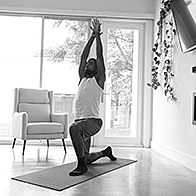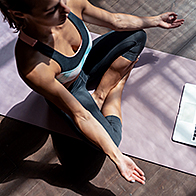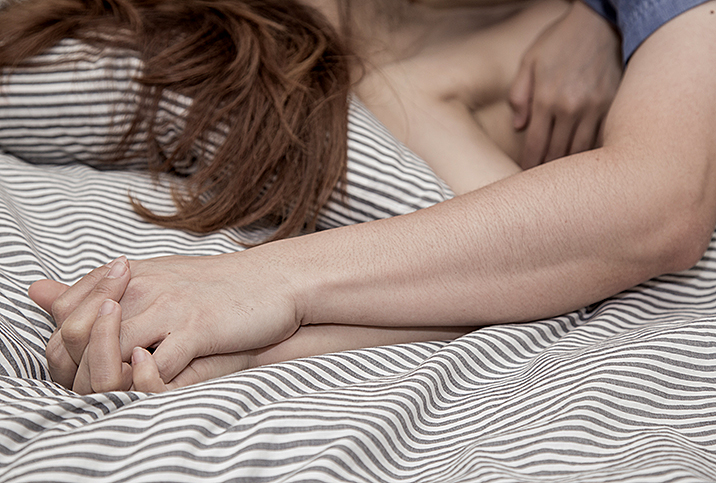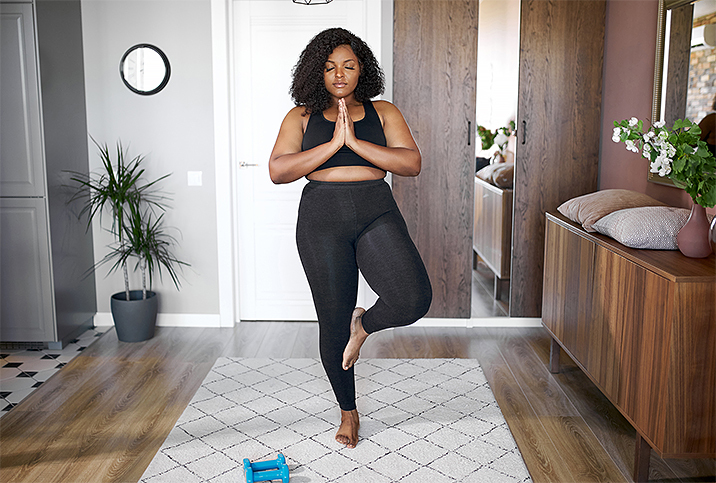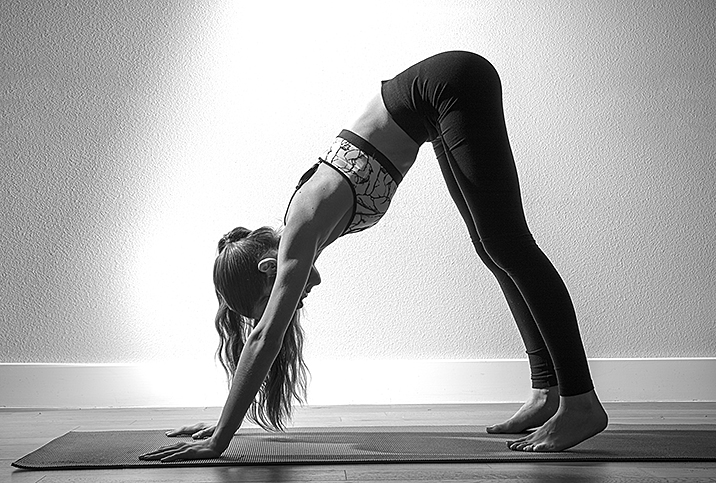Exercise Can Reduce Your Anxiety—And It's Not As Hard As You Think
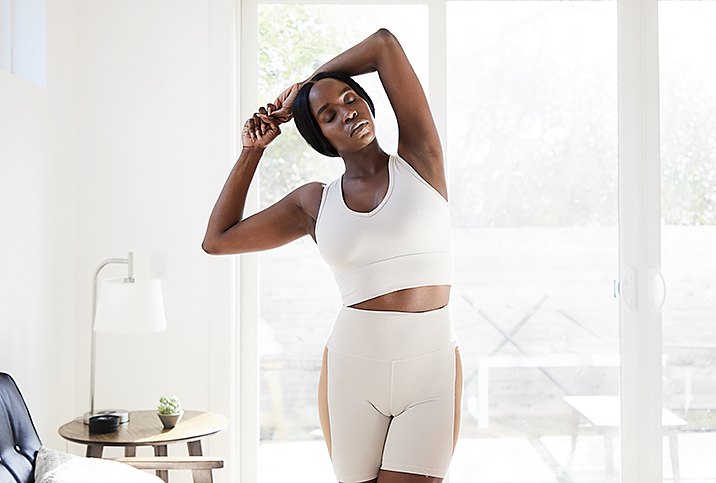
I never really understood anxiety until it came knocking on my door. When my husband was diagnosed with stage 4 cancer and thrust into emergency treatments, which led to more problems, my body and mind were put through the kind of fight-or-flight situation that had me on high alert for 69 days—the time that transpired between his diagnosis and death.
Once your body and brain are flooded with stress hormones like that, it doesn't just revert back to "normal." In addition to my grief and post-traumatic stress disorder (PTSD), I found myself plagued with anxiety. The loss of control over my life, over my husband's death, over the future and all we'd planned together, and the resulting disarray I was faced with made me feel like my mind was in overdrive. Any unexpected change could throw me into a panic attack. It didn't matter if I knew I was safe, my body's fight-or-flight response was in charge—I just needed tools to get it back under control.
I went to therapy, changed my schedule, focused on healthy eating and I exercised. In fact, my therapist and I called the walking I started doing my "anxiety walking." I would walk, often for hours, as a way to help me get my anxiety under control—and it helped. A lot.
It's been about four years since I started living with anxiety. And while I still have moments where I "spin" and can't keep myself on track, I have found that walking, surfing, running, dancing and horseback riding have all played significant roles in helping me reclaim a version of myself that feels more recognizable. The link between exercise and controlling the symptoms of anxiety is clear—science backs up the benefits.
So if you're faced with anxiety, whether acute or chronic, here's what you need to know about using exercise as a tool to help manage your symptoms.
Anxiety rates are on the rise
First, it's incredibly important that you know you're not alone. Anxiety has long been a recognized mental health concern, and the COVID-19 pandemic, combined with numerous other national and personal stressors (political upheaval, racial unrest, uncertain economy, health issues, major changes to work and school life), have all played a part in increasing rates of anxiety in the United States. In a 2021 survey conducted by the Harris Poll and the American Psychological Association (APA), respondents indicated stress levels remain higher than pre-pandemic levels. For one-third of respondents, stress levels are sometimes so high that even basic life decisions, like what to wear today, are hard to make.
"Research shows that more Americans are experiencing extreme levels of stress and anxiety," said Andreas Michaelides, Ph.D., the chief of psychology at Noom. "These increases are so severe that the APA rightfully declared our current moment 'a national mental health crisis.'"
As Michaelides pointed out, the current national and global states of affairs have left many people without a sense of control over their lives, outcomes or a clear path for the future.
"Anxiety can stem from unpredictability and uncertainty about the future," he says. "On top of that, people are experiencing more social isolation and loneliness due to the pandemic. This makes coping very difficult because many people normally rely on connecting with others as a way to decrease anxiety."
'The massive rise in anxiety that we have seen during the pandemic is actually quite normal—it is a common human response to the adversity and challenges we have all faced.'
Whether your symptoms of anxiety are old or new, it's important you don't frame them as inherently negative.
"Anxiety is a warning signal that something is going on," said Caroline Leaf, Ph.D., a neuroscientist, mental health expert, and the host of the Cleaning Up the Mental Mess podcast. "In fact, the massive rise in anxiety that we have seen during the pandemic is actually quite normal—it is a common human response to the adversity and challenges we have all faced. Tuning into our anxiety signals and seeing them as messengers telling us that there is something we need to address in our lives can help us to embrace, process and reconceptualize these feelings in order to come to terms with what has happened to us or what is happening to us."
Of course, seeking out professional mental health resources is an important first step when looking for anxiety-reduction solutions. Many lifestyle habits, such as exercise, can help improve symptoms of anxiety, too.
"There are lots of ways making lifestyle changes can help with anxiety and its symptoms," Michaelides said. "First, making lifestyle changes typically involves establishing a routine. Routines can decrease anxiety by giving people a sense of control in their lives. Making lifestyle changes may also improve anxiety by changing your coping strategies. Exercise, meditation and healthy eating habits can lead a person to feel better about themselves. In other words, lifestyle change can lead to more helpful coping techniques, which can replace unhelpful coping mechanisms, like stress eating or abusing alcohol."
How exercise can help reduce anxiety
While there are lots of healthy lifestyle changes linked to reduced anxiety symptoms, exercise is one of the most well-researched options.
"Exercise stimulates the body to produce serotonin and endorphins, chemicals in the brain (neurotransmitters) that help depression and anxiety," said Haley Perlus, Ph.D., a sports and performance psychologist. "Studies have shown a decrease in anxiety with increased physical activity, especially mindful movement, such as yoga, meditation and even tai chi."
Participating in regular exercise can increase self-esteem, create a sense of empowerment, and enhance social connections and relationships.
In other words, exercise isn't a "one-trick pony." In addition to the chemical and hormonal benefits exercise elicits, it's often a social practice that can boost mood and a sense of control on several different fronts.
"Researchers have many hypotheses about why exercise might be beneficial," Michaelides said. "There are three themes in the research. First, it's possible that exercise may improve the body's functioning. One example is that exercise may release feel-good hormones (like endorphins) that improve your mood. Second, researchers believe that exercise may improve the body's immune functioning. The thought is that improving the immune system can safeguard the body against mental health problems. Finally, research suggests that exercise can influence psychology. For example, by exercising, people may feel a sense of mastery or ability to succeed in life that can curb things like anxiety and depression."
While Perlus points out that mindful movement exercises like yoga or tai chi are positively associated with a reduction in symptoms of anxiety, you're not limited to them if you're hoping to reduce your body's physiological stress response.
"One study found that people experienced a similar reduction in anxiety whether they performed aerobic exercises, like walking or jogging, or nonaerobic exercises, like muscular strength, flexibility or relaxation," Michaelides said. "Good news: Most evidence suggests that exercise in any form can improve anxiety and mental health."
Implementing a workout for anxiety reduction
One of the challenges of being stuck in a difficult mental health pattern is figuring out how to implement new strategies or changes to get yourself out of the rut. This isn't something that happens overnight. You may need time to figure out an exercise program or schedule that works best for you. But one thing to keep in mind is that while more exercise is better, even little, bite-sized chunks of daily activity can help you see results.
"To significantly improve anxiety symptoms, you should incorporate about 30 minutes of exercise a day for about three to five days a week," Perlus said. "However, as little as 10 to 15 minutes of physical activity may also make a difference. Sometimes a 10-minute walk can be just as good as 45 minutes of weightlifting."
One thing each mental health expert I talked to for this article agreed on is that there's no one-size-fits-all prescription when it comes to exercise and reducing feelings of anxiety. Aside from aiming for at least 10 minutes of exercise a day, most days per week, all the psychologists were quick to point out that what works for one person may not work for another.
One thing to keep in mind is that while more exercise is better, even little, bite-sized chunks of daily activity can help you see results.
"Like all forms of therapy, the effectiveness of exercise can vary," Perlus said. "Some may respond positively, while others may find it doesn't improve their mood much. This is why you should always be sure to practice intuitive exercise by learning to listen to your body and allowing yourself to stop when you're tired, rather than pushing yourself to a breaking point."
Your best game plan for creating a successful workout program for anxiety reduction is to start small. If you haven't been active, carve out 10 to 15 minutes per day and choose an activity you enjoy. Try a simple walk outside, an online yoga workout designed for stress relief or crank up the music in your house and spend 10 minutes dancing around. The idea is to choose movements you'll enjoy and can make a habit of. (Remember how important Michaelides said routine creation can be for gaining a sense of control in your life.)
Afterward, check in with yourself. Change the activity or add a little more time based on your results. Understand that simply enjoying your exercise routine can help improve mental health. And don't be shy about implementing "nontraditional" exercises, such as standup paddleboarding, hiking or slacklining, if you prefer something a little more adventurous.
Other lifestyle changes that can help
It's important to remember exercise isn't the only lifestyle change that can make a difference to your mental health.
"Exercise is probably the most critical place to begin," Perlus said, "Numerous studies have found exercise to be effective in elevating your mood and improving anxiety symptoms."
However, she's quick to admit it's not the only option. She adds that diet, sleep, stress reduction and building a solid support system are all helpful as well.
Even thinking about taking on lifestyle changes can feel overwhelming when anxiety is taking over your thoughts. So, instead of thinking about all of the lifestyle factors you "should" be doing to reduce your anxiety, give yourself a break. Remember, little changes can help give you a sense of control and a mood boost that may just start the ball rolling. Start with a single 10- to 15-minute workout of your choice and take it from there. And, of course, talk to a counselor if feelings of anxiety are interfering with day-to-day life.







